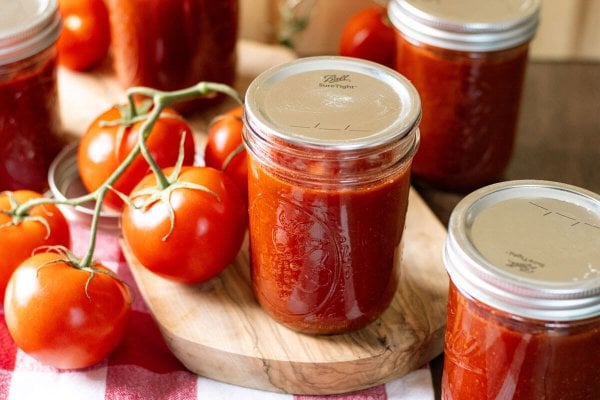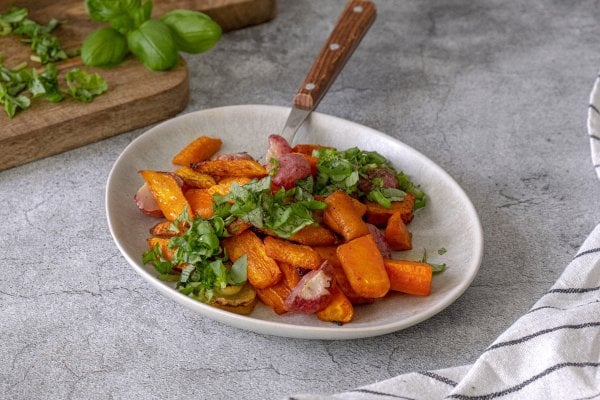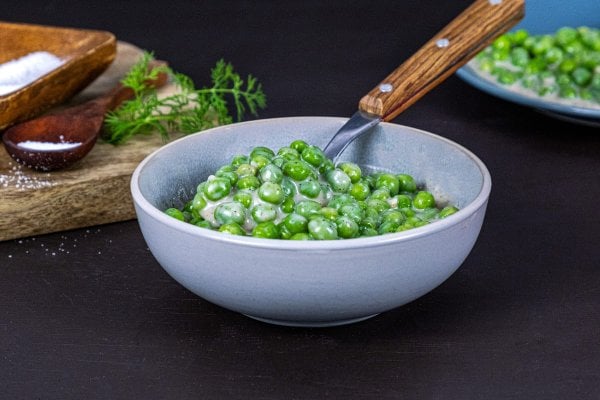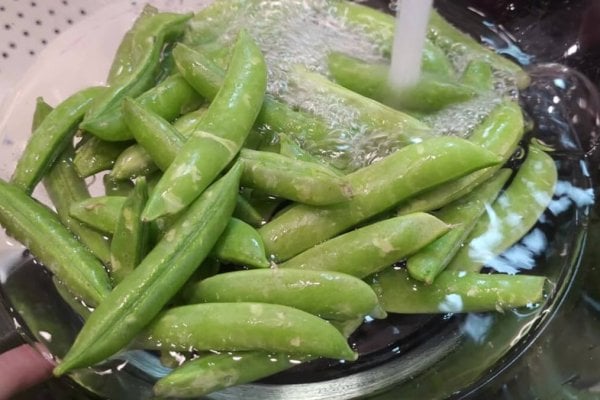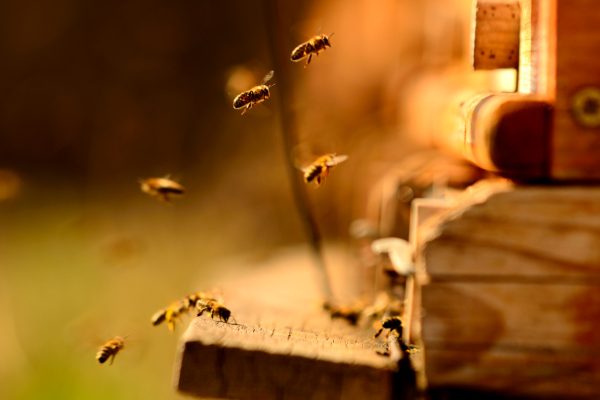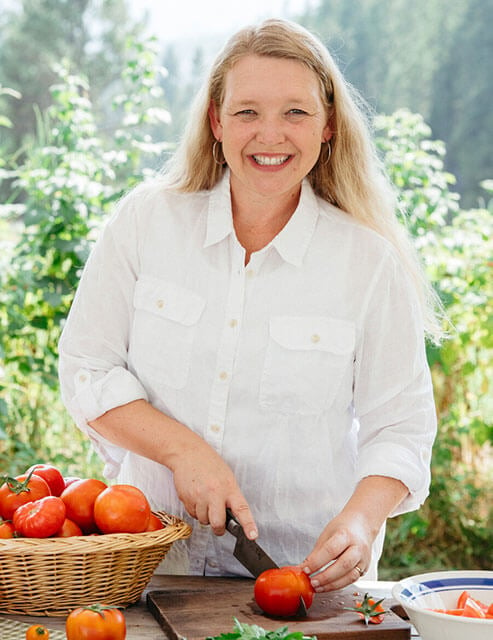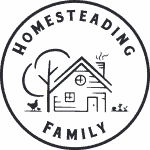We’re living in uncertain times, and the stressors of this life can easily get us off track of what’s truly important. Come hang out with me and Mary from Mary’s Nest as we discuss how to start cooking from scratch, saving money in the kitchen, and learning lessons from those who lived through the Great Depression to live a simpler life.
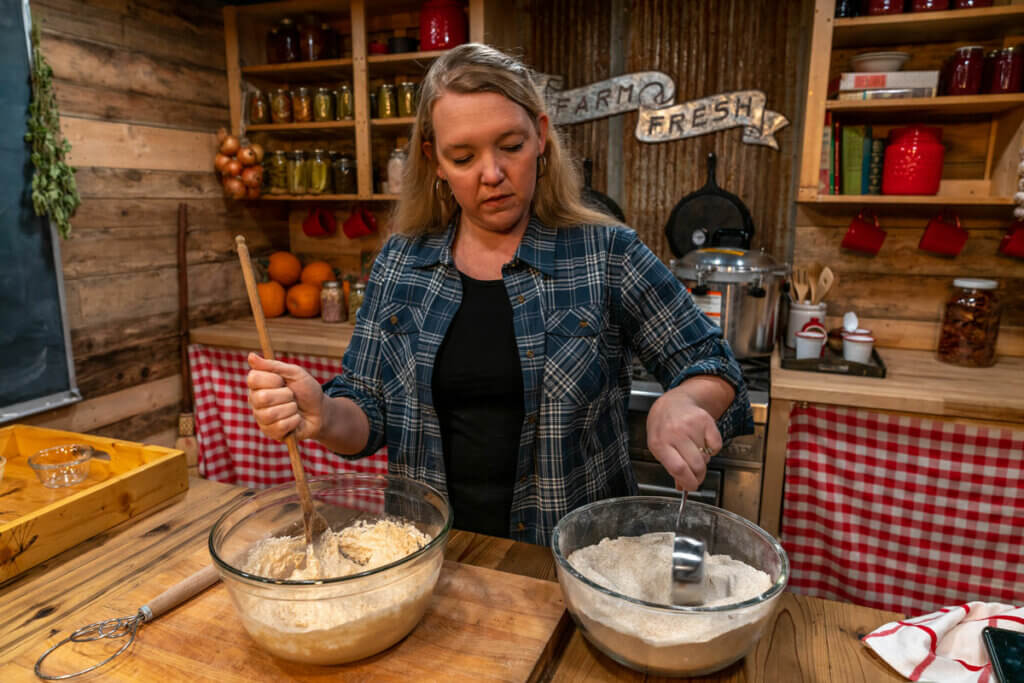
More About Mary
Mary is a former New York City girl, now a Modern Pioneer. She loves living the simple life with her husband in the Texas Hill Country. She’s been a Modern Pioneer in the kitchen making traditional foods for over 20 years.
She loves creating nutrient-rich meals that nourish her family and friends!
Mary learned how to cook healthy meals from her mother, who is currently 98 years old. Mary’s parents lived through the Great Depression eating frugal dishes like Hoover Stew and Potato Peel Pie. They learned how to be thrifty, but also live with abundance.
She remembers all her food growing up was homemade. Most of the time, Mary was found right beside her mom in the kitchen learning these skills.
Why Now is the Time to Prepare
There are a lot of people who are living in fear. This brings up feelings of needing to “prep” for what’s to come. But we like to look at this a bit differently. We let the times we’re living in motivate us to broaden and deepen our skill sets.
There will never be a time when you regret learning how to make homemade bread, cook from scratch, grocery shop on a budget, or prepare some freezer meals for a rainy day.
There will never be a time when you regret growing a garden. You’ll never regret raising your own livestock and knowing where your food came from. Or knowing how your food was tended to and the love and care that went into it.
These traditional skill sets, though they’re not as common in this modern world, are still very much applicable to life today.
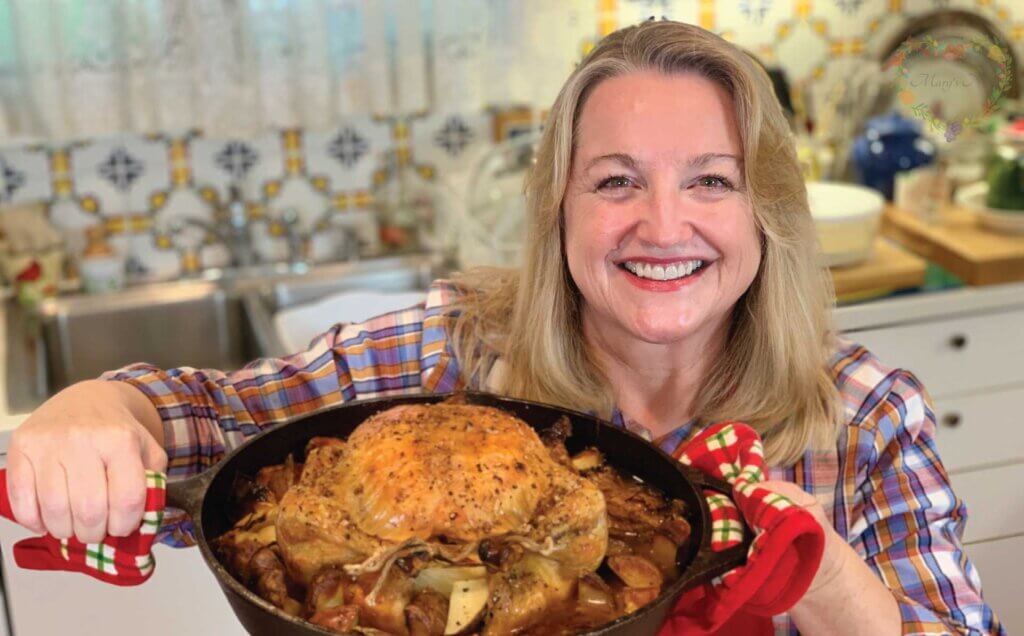
In This Episode
Mary and I discussed a variety of topics in today’s Pantry Chat, below are the topics with related links.
- Food Affects Everything – It’s so incredible how good nutrition and good food improves our health and helps us in all areas of life. Not just in the energy we have, but it affects our mood, our health, how well we can focus, our weight and other medical issues. Food affects these things either positively or negatively. Many times when people are under stress, their diets don’t promote the ability to handle that stress well.
- Eating Traditionally on a Budget – If you’re at the beginning of your journey, taking your kitchen from a processed foods kitchen to a traditional whole food kitchen, you can absolutely do this while on a budget. You probably don’t even need to change the grocery store you’ve been shopping at!
- Start with a Roast Chicken – When learning to cook from scratch, Mary always recommends people start with a whole roasted chicken. This humble meal is something everyone can make, most families love how it tastes, and it’s a great affordable option.
- Don’t Focus on Quality Yet – When you start cooking from scratch, don’t focus too much on the quality of food (organic, free-range, etc). By prioritizing whole foods over processed foods you’ll still be better off in the end. Once you get the hang of cooking whole foods, then you can start improving the quality of the ingredients.
- It’s a Process – You may start by roasting a whole chicken or making roasted garlic chicken. Then, once that becomes easy, you’ll then turn the chicken carcass into homemade bone broth. You’ll start saving vegetable scraps to flavor the bone broth. And next, instead of using water to cook rice, you’ll use bone broth. These skills layer on as you’re ready. And you may be happy to find out they’re not that difficult to learn.
- So Many Resources – The beauty of learning these skills today is that they’re literally at your fingertips. We have so many recipes here on our website, over on YouTube, and within our membership area. There’s really no excuse for not being able to learn these homesteading skills to improve your health.
- Saving Money – The more you implement traditional skills into your everyday life, the more you’ll notice the savings on your grocery bill. Buy whole carrots instead of peeled mini carrots and make carrot top pesto if they have the greens. Buy individual spices instead of the spice packets (or try making your own homemade herb seasonings from scratch).
- Don’t Be Brand Loyal – If you’re grocery shopping and you see “off-brand” products that cost less, toss those in your cart! If you’re not making your own homemade mayonnaise, homemade ketchup, or homemade mustard, look at some of the off-brands. See if you can start saving a few pennies here and there, because all those pennies add up!
- Try New Things – Don’t be afraid to try new things! There are a lot of extremely nutrient-dense foods that are cheap, like organ meat and savory beef tongue. You just have to know how to prepare them. Mary mentions that she frequently recommends people try kippers and rice. Kippers are smoked herring, but they’re packed with nutrition, are very inexpensive, and are pretty simple to prepare. Mary’s rule of thumb is to “just try it once!”
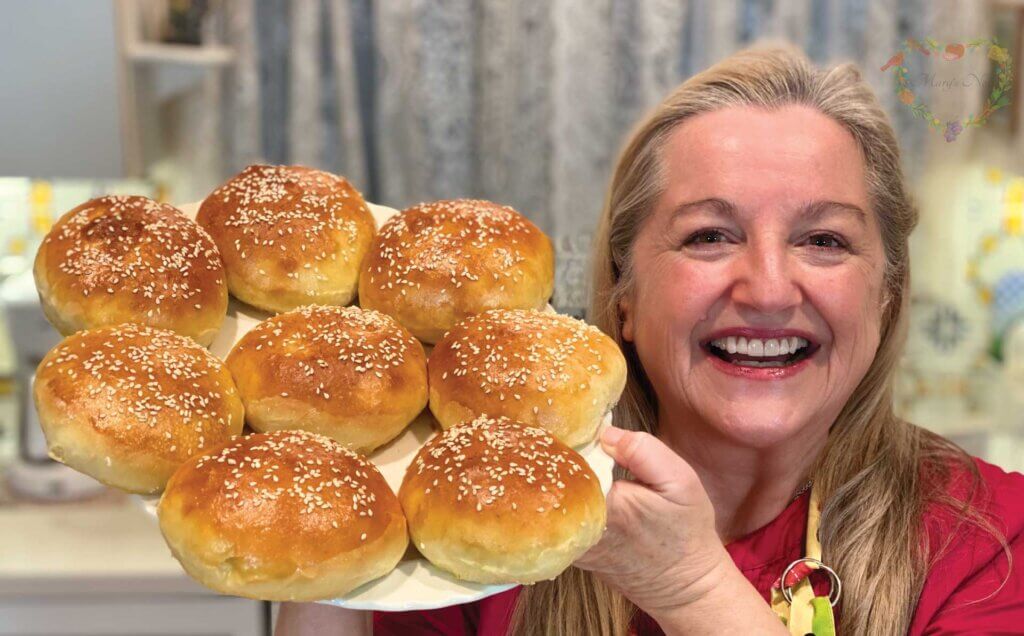
Where to Find Mary
You can find Mary all over the internet:
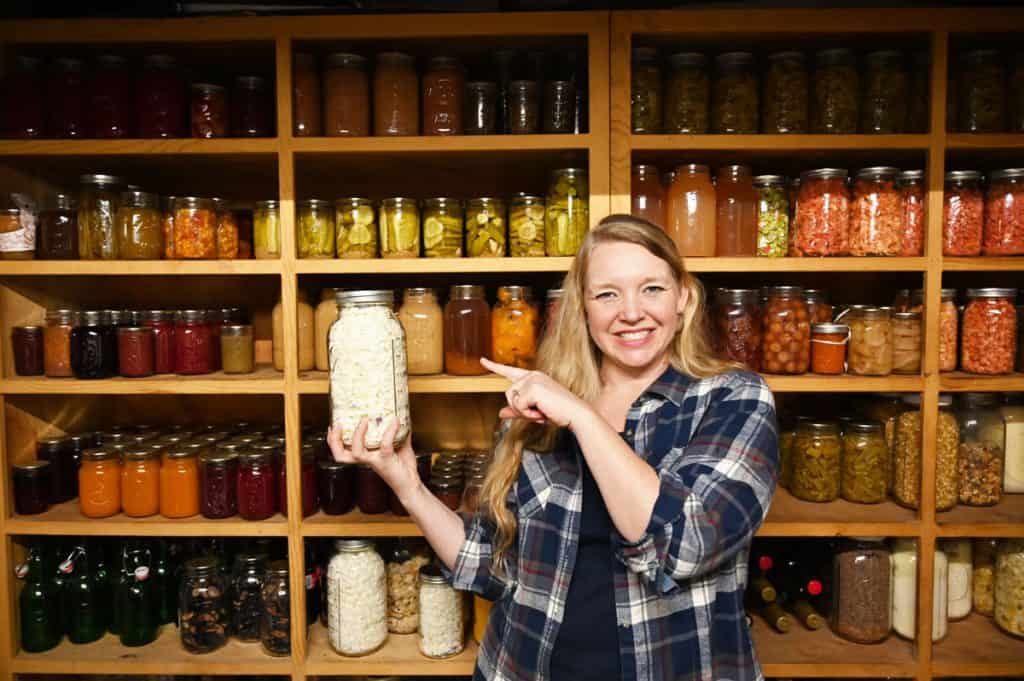
More Posts You May Enjoy
- Meal Planning on the Homestead
- Woodstove Cooking on the Homestead
- Building Up a Well-Stocked Pantry
- How We Use Food Storage Barrels & Best Foods for Long-Term Storage
- Prepping Your Pantry for Preserving Season
- 7 Pantry Staples to Always Have (Never Run Out Again!)
Carolyn: Hey you guys, and welcome to this week's episode of The Pantry Chat: Food for Thought. Today, I am here with a really special guest. I am super excited to be able to welcome Mary from Mary's Nest here onto The Pantry Chat. We're going to be talking about I think it's a really important subject, especially for this year, and that is making the most out of what we have already in our kitchens or available to us. Specifically, looking back in history, learning the lessons that so many people have learned before us, and taking a clue from them and learning from them so that we can cut the grocery budget a little bit this year maybe, but still eat really, really well and great nourishing foods.
Mary, thank you for being here. Welcome.
Mary: Oh, thank you so much for having me, Carolyn. I really appreciate it.
Carolyn: Now, you guys, if you have not watched Mary's YouTube channel, you really, really need to jump over there and watch it. She has just the most amazing videos that are so clear and so helpful on learning about traditional cooking, really specifically. You cover all sorts of things though on there, Mary. You cover pantry storage and the traditional cooking, making all sorts of amazing foods that are so nutrient dense and good for your body.
I'd like to dive into your history just a little bit though, to start with. Did you learn this from a mom, or where did you learn how to cook in a traditional way for the health of your body?
Mary: I really learned everything pretty much that I know from my mom. My mom is 98 years old, so I always like to say she knows a thing or two. But it was very interesting because growing up, as I've shared with you in the past, she and my dad were living through the 1930s, Great Depression, the rationing of World War II, gas lines and inflation of the '70s. She lived through the whole gamut of things. Both her and my father were exceptionally thrifty, and not in a bad way. We always seemed to have abundance, abundance in terms of what we were eating, but everything was homemade.
She would figure everything out. There were some things, like she knew how to make a sourdough starter and make sourdough bread, but she was using what she could find at the local market. She would have some all-purpose flour or bread flour and she'd have her starter. Then my father was very fond of rye bread, he worked in New York City, I'm from New York, and he searched out some source for rye flour. Then she said, "Okay, I'm going to figure out how to make rye bread with my sourdough starter."
My mother is Italian and sauerkraut was not something that was common to her. My father is actually of Irish ancestry, but he worked in a deli where Mr. McGillicuddy, I kid you not, Mr. McGillicuddy would give him a big slice of liverwurst. Then he would go next door to the bakery, where Mrs. Linda would, this what he called her, Mrs. Linda ran the bakery and she was German, and she would make rye bread and she always had a barrel of sauerkraut. He would say, Oh, Mrs. Linda, what can I do around your bakery to clean up," or whatever. She'd give him a job and then she'd give him the rye bread, the sauerkraut, and the liverwurst, and he would just love that.
Even though my mother, being Italian, she knew about fermented vegetables because she would make what they call a giardiniera, it's the cauliflower and the carrots, and so we had things like that. Then she started making sauerkraut. It was a riot because we lived in a very Italian type neighborhood and people were like, "Gloria, what are you making?" We had the sauerkraut and the rye bread, and of course just the regular sourdough.
My mother would always have me in the kitchen. She was very traditional and she felt such a responsibility to teach me the domestic arts, to teach me how to cook, to how to sew, to how to clean, all these things, because in her mind I was going to get out of high school or whatever and get married and I would need to know how to do these things. It was very important to her. When I was about four years old, I had asked her, "How do you make toast?" She was like, "Oh, wonderful," that was her entry. I had showed some interest so we were going to make toast, which started with learning how to make bread.
She explained to me about the sourdough starter, I have very vague memories of this, but then as time went on, she would teach me fermentation. How to make yogurt was such a basic thing. It's funny, my husband, I was just reminiscing with him how I would never eat Danone yogurt at the grocery store because I was horrified by the fact that there was something, I didn't realize it was fruit, that there was something on the bottom because I didn't grow up seeing that. We made homemade yogurt all the time.
It was funny because my father was a much more mainstream person. He would look at stuff on the counter and he would say, "Gloria, shouldn't you refrigerate that?" We laugh to this day, my mom and I, because she says, "Oh, don't worry, it's already gone bad." It's like having gone bad was a good thing, it had soured. We had a little farm up the street from us. We lived in the suburbs basically, well, what they would call rural residential. There were houses, but people had say two, three acres. There was a little farm up the street and my mom had a little metal box out outside of her front door, and the man would put the raw milk in there. This was very common and this is what I grew up with.
I will confess, the concept of soaking and sprouting, that was newer to me when I started reading Nourishing Traditions. Foods like kefir and kombucha, obviously we didn't have those, but my mother had had a host of other types of fermented beverages that she would make. It was always everything, and this I think is being more ethnic than being American and this is what my mother would tell me, she would say, "Americans are very concerned about heart health," and not that that's a bad thing. She said, "When I was growing up, my mother, being Italian, although living in the United States, was very concerned about digestion." I think that digestion plays such a significant role when you talk about traditional foods, because the whole point is to be able to digest our food so that we can absorb the nutrients from it. That was just so important to my mom, and she had to make sure that I knew how to, as she would say, properly prepare the evening meal.
Carolyn: You're touching on so much, it's so important right here. Tell me again, how old is your mom?
Mary: She's 98.
Carolyn: She's 98. There is just so much depth of wisdom with this older generation. I was just sharing a story about my grandfather when he was 98, he's now passed on at 99, but at 98 he would still wait until the hottest part of the afternoon in Florida and then he would go out and mow his lawn at 98 years old. I don't mean a ride-on mower, like a good old push mower. He said, "Well, you have to sweat. It's good for you." For him, that was his physical, that was therapy, that was health. There's just so much knowledge, and we really need to be telling these stories and sharing these stories to learn from these things before they're gone, because not all of us have access to 98-year-olds in our lives or 99-year-olds in our lives who can tell these things and can share them.
I absolutely love it that she's here and she's going, "Oh, what about your digestion?" We've come full circle to that, haven't we?
Mary: Yes.
Carolyn: We're starting to realize that everything goes back to digestion.
Mary: It does. They talk about the nerve that runs from the stomach to the brain to the heart, everything, the good bacteria, the good, I always say this word wrong, probiotics, these things are so important today. We are hearing it. It's funny, because my mother is the sweetest lady you ever met and she would never go around saying, "Oh, I've been vindicated," she's not like that. But I remember, was it the '70s or the '80s when the low fat movement kicked in, and my father was telling her, "You really need to stop eating butter," and she would be like, "Oh, okay. That's nice," and she kept eating her butter. I would go-
Carolyn: Smile and nod.
Mary: Yeah, that's right, yeah. She was in charge of the kitchen. I would say to my mom, "Yeah, do you think we should buy margarine?" She would have these cute terms, she would say margarine is a prepared food or packaged food. Now, today, I think people say fake food or whatever. Like the white icing between the Oreo cookies was glue, she would say, "It's glue, don't eat it." But she would say, "No, no. Margarine's going to set you on a path of bad health."
I find it so cute about your grandfather because my mother would be right there with him. My mother was a firm believer that you had to be out in fresh air and sunshine. The woman never used sunscreen, but she didn't sunbathe. She had a hat on and was working in her garden. Yes, she would be very perspired and she was like, "This is good, this is healthy." I find it so interesting that so many things we got off track with, unfortunately, and much to our poor health. 98 years old, my mom's never had an operation.
Carolyn: Wow.
Mary: That just is amazing to me. She's sharp and she laughs. We have some fun because she does wear eyeglasses and my husband will clean them with the eyeglass wipes, but this is how cute and how sharp she is, she'll put the eyeglasses back on and she'll say to my husband, "Oh, you look more handsome than you usually do," or something cute like that, "More handsome, and you're always handsome, but even more handsome." 98 years old, she's sharp and she's laughing and she's making jokes. It all boils down, yes, there's the role of genetics and all of that, definitely, everybody in our family lives to be very old, but I think even if your genetics don't lean that way, you can help yourself by eating nutrient-dense foods.
It can be a challenge, that's why I always tell people, do this slowly if you're new to implementing these types of foods into your diet. Unfortunately, sometimes, you talk about budgets and whatnot, some of these things have become very trendy and are a little more expensive and so we've got to look for options, but the good news is I think there are a lot of options. There are a lot of nutrient-dense foods out there, we just need to be open to them and be willing to try them. But in the long run, I think it's going to keep us out of the hospital.
I will say, with everything that we went through in 2020, I managed to survive. Then in 2021, you're out and about, what can you do, and I caught the virus, but I have to tell you, my oxygen never went below 95, I never had to be hospitalized. I was taking my bone broth, taking my elderberry syrup. I had no medication. After about a week I was doing good. I'm 65 years old, so I'm in that category where you heard people passing away, it was scary, but again, I credit it to the fact that we have a nutrient-dense foods diet.
Carolyn: Yeah, I think that's so important. That gives you a foundation for everything, doesn't it?
Mary: Yeah.
Carolyn: But you're also touching on something else that I think is so key, I'm going to go off on a little bit of a rabbit trail here and leave the food for just a moment because I think it's so applicable to our time right now, and that is the people from this generation that we're speaking of, this older generation, they had a mindset that was determined to be cheerful and just figure it out and keep going. I know we had Great-Grandma Jeanie living with us before she died, she was in her nineties. I remember there was a moment where it got challenging. It was challenging already, it was the height of summer, the gardens needed everything, things were starting to be harvested, and then the kids got head lice.
Oh goodness, I thought I was just going to have a conniption. I was like, "I don't know." We'd never had lice, I'd never dealt with it. She was here, and I remember her saying to me, "We just do what needs to be done. We don't need to worry about it or get upset about it." It was such this just, "Look, this is where we're at. Don't get too alarmed about it, just roll with it. It's going to be okay." That's really spoken to me over the years, and I think it says a lot about that generation.
On the other hand, right now we're seeing a lot of fear. I don't know if you're seeing this, Mary, but there's a lot of people who are very concerned. I think there's good reason to be watchful of the times right now. I think there's things we need to be aware of and be responding to, but there's also a lot of fear that's happening and people are scared regarding the food supplies, they're scared regarding the economy and the political situation, just all these different things that are happening. Yeah, there's a lot of things that are changing right now and it does make us feel unstable, but living in that fear does not help us solve it, it doesn't help us move forward, and it doesn't help us maintain either a healthy body or a healthy spirit by walking in that fear.
This is just something we see so strongly in that older generation that had to come through so many things, is just we just do what we have to do next and you might as well enjoy today because there's no guarantee that there'll be a tomorrow. Do you experience that with people in your life?
Mary: Oh my goodness, I will say starting with my mom and my father. My father lived to be well into his late eighties. It's cute, my mother was actually six years older than him, but in any event, it's cute because she got married when I think she was about 30, so she was quite a trendsetter back in the day. I think she probably would've liked to have gotten married earlier, but in any event, I think the good Lord was just having her wait till she met my dad. But yes, both of them were total optimists. It's rather amazing given how they grew up. My father was so poor that they used to have to search out of garbage cans for food and just bring them home and make the best of it. He was really poor. He lived in Jersey City. My mother, it was a little easier for her because she was in more of a suburban area of New York City, which was, again this is the 1920s and the 1930s, rural residential. There might be a little farm and then houses with little lots like that.
But my son had the best description of my parents. He said, "Grandma and Grandpa not only see the glass," you know the expression the glass is half full or the glass is half empty? He said, "Grandma and Grandpa not only see the glass as half full, they see it as overflowing." I thought that's so true. Neither of them had easy lives, they had really hard times. My father was in the Korean War, he was wounded, he spent two years in a military hospital trying to recover, and coming from such poverty. Yet, my parents worked so hard. My mother never sat down. My father had to go back to high school when he was in his twenties and then night school for college. It's amazing to me, even up until her eighties, my mother was up and down all the time. The energy level is just shocking to me.
But something that my mother would always say when I was a teenager, it's interesting you're talking about people worrying and feeling depressed and it does seem very amplified today, but it was around when we were young too, and I think especially you see it amongst kids in high school and college because the future seems so uncertain to them. There's a lot of emotion and a lot of hormones and all these things going on. I remember something, just like your grandmother talking to you about the lice, I was going on to my mother about something, I don't even remember what it was, and I was going on and on and on, just some trouble, on and on and on and on.
My mother was always there to listen, always to help with problems. She'd help all the kids in the neighborhood, everybody loved her. But I was just really going on, I was spiraling down, you've heard that expression. My mother looked at me and she sat me down, my full name is Mary Louise, and she said, "Honey, Mary Louise, you go on and on and on. It's really not necessary sweetheart. We just pick ourselves up. God's in his heaven, all's right with the world. We'll get through this. We got to work. Work is prayer, let's work, let's keep busy. Let's stop complaining." That was a light bulb moment for me.
I'm so grateful that our son was able to know my father too when he was alive and still with knowing my mom, because he's in that exact demographic of young people, he's 24, of young people worrying, like you said, all the different things, the economy, the political situation, whatever the case may be and they hear all this stuff and they worry, but he's very optimistic and he really got this, I think, from my mom just always saying, "Oh, everything's going to be fine. It works out. Just keep busy, just work." I think that we've lost a little bit of that work ethic.
My parents, they're Catholic, but they had, you hear the expression, Puritan work ethic, the Yankee can do, they're East coasters, Yankee can do spirit, work, work, work, work, work. That was the mindset, and they never seemed to fall into a depression or really worried. They weren't going around with rose-colored glasses, but they were taking action to at least control what they could control and not worry so much about what they couldn't control.
Carolyn: That makes a lot of sense, because I think the modern advice is to dig into those concerns, dig into that anxiety, let's explore that, let's think about it, maybe journal about it a little bit. You find yourself, if you do that, and I know I've had this struggle at different times, of not getting into necessarily a depression, but boy, if you get into a funk and you start just dwelling in that, you can stay there an awful long time, feeling more and more sorry for yourself. But if you get up and you go, "There's people a lot worse than I have it right now. What can I go do to help my family or help somebody else," and take your eyes off yourself for a few minutes, wow, it just changes the scenario completely around. Then next thing you know, you're going, "Well, that wasn't such a big deal. Why was I so upset about that?"
It's so much wisdom. We really face a cultural problem when we take all of this wisdom from this older generation and we throw that out and instead we go follow an expert who's learned something at a college from another expert who's learned it from another expert, and who knows how many of them have lived the life and had to live through that. Just so much wisdom here, so I absolutely love it. I think it's so important for our time. There are solutions to all of the things, there are things that you can do today that they may not change the state of the world, they may not change some of these big things that are happening, but there are steps that you can take to move your family, move yourself to a better place.
This just comes full circle right around to the kitchen idea and eating better. It is hard to feel good in any capacity, emotional, spiritual, physical, anything, if you're not eating well. It's just a base principle in life. Your brain needs nutrition, it needs it badly in order to feel well. If there's somebody, Mary, who's just getting started, maybe they're used to just eating a standard American diet and they're thinking, "I want to make some changes. I need to save some money at the grocery store, but I really want to eat better at the same time," is that even possible, or is eating better relegated to health food stores with super high prices?
Mary: I think it's very easy to do. I sound like a broken record because ... When I say easy to do, it's easy to do to make the transition to eating healthier and to just shop at a regular grocery store, if that's all you have access to. If you have access to a farmer's market, if you have access to a local farm or a local ranch, all the better, but if you are just right at the beginning of your journey, from what I like to say, a processed foods kitchen to a traditional foods kitchen, and you are right at the beginning, you live in the suburbs or you live in the city and all you have access to is some local grocery store, I do feel that it can be done. I think it can be done easier and for less money than eating a processed foods diet.
I know I sound like a broken record because I say this a lot, just start with a roast chicken. I don't care where the chicken came from. If you can buy organic, if you can buy pasture raised, I think that's wonderful, but that's not always in everybody's budget. Sometimes people will tell me, "Well, you just have to make room. You have to make it possible in your budget," and sometimes you can't. Sometimes gas is really high and sometimes heating oil is really high and sometimes your kids need clothes, they're growing or whatever the case may be. I never want to stress people out and I never want to say to people, "You have to buy the most perfect chicken." I say buy any chicken, but buy a whole chicken.
Even if you can't handle looking at it or touching it with your plain hands, get some disposable gloves, but just put that chicken into the oven, roast that chicken. You can just throw some vegetables, cheap vegetables, carrots, they're usually pretty affordable, onions, maybe you can get some potatoes, and roast it all together in one pan. Now you're on your journey to a traditional foods kitchen, because number one, the good news is most people like roast chicken. You're not trying to say, "Hey kids, I've got liver beef nuggets, come to the table." "Liver, Mom, really?" But I think everybody pretty much likes a roast chicken and it makes a wonderful aroma in your home. It doesn't need to be perfect. Nobody needs to be perfect, nobody needs to stress their self.
I may have shared this story with you once before. I was reading something online and this girl was so upset, the writing just went on and on and on with no paragraphs and no capital letters and she was probably crying. It was all complaining about trying to have a traditional foods kitchen. It was one of those forums, maybe Facebook or something, where people can comment on what she's saying. I put, "Oh my gosh, don't worry about any of that. Just roast the chicken. Don't worry about sourdough, don't worry about ferments. That's farther down the journey."
Sometimes you can get a chicken, and I know I get a lot of criticism for this because people don't like when I say this, but just buy any chicken. If you can get a chicken for 99 cents a pound, I think it's better than going through a fast food restaurant, even though maybe the chicken wasn't raised perfectly, I totally get that, but it's better than going through a fast food restaurant and feeding yourself or your children or whomever some kind of commercially-prepared fried thing that you don't really even know if it's chicken.
I think there's something that's so important, and this goes back to talking about our parents, in my case, my parents, in your case, your grandparents, you sit down at the table, if you're religious, you say grace, if you're not, you just take a breath, and serve a meal. Even if you're alone, I was alone for a very long time, I was on the verge of turning 40 when I got married. I lived a single life a really long time. But even if you're alone, you sit down, you take a minute, you take a breath and you enjoy something that you cooked.
The nice thing about a roast chicken is it's really not a lot of work on your part, it's a work on the oven. Then if you have a family or if you have friends, I often, as a single girl, it was funny because I would say to my neighbor, and maybe she wasn't cooking, and I'd say, "Do you want to come over?" The funniest response I ever got was she looked at the chicken dinner and she said, "Oh my God, Mary, you live like an adult." I said, "We are adults." We were in our late twenties and I was like, "We are adults."
I find that you eat this roast chicken, you make conversation with your family, if you have some children who may be making the face about this not looking maybe what they're used to, I always say employ my mother's way of handling these things when she was feeding kids, it was, "Oh, how are you today? How is your school?" whatever. I'm an only child, but my cousin's father died early and her mother had to go back to work and so she was often with us, and there would also sometimes be some neighborhood kids. If they would be like, "Oh, I don't eat this," then my mother would be like, "Oh, and what are you kids doing today?" She would completely avoid it. Eventually people got hungry enough, and I'm eating away because I knew that's all that was going to be on the table, she was not a short order cook.
But I think that's how you start. You buy something that's whole, a whole food, without having to go to the store by the same name, your local grocery store, you buy real foods. There are so many videos with internet today, there are so many videos on how to roast a whole chicken. It's really a doable thing. After you do it a couple of times, you're really on your journey now, because now you've got the carcass and now you're making bone broth and now you're taking white rice, but instead of water you're using bone broth, maybe you've even been able to convince yourself to buy a little butter and so you put a little butter in that rice, and maybe you saw some sea salt and you say, "Okay, I'll throw in a few minerals."
Little by little by little, you're transitioning to making real food. That's the most important thing, that you're just making real food before you even graduate maybe to the super nutrient-dense foods. You're just making real food and you're trying to make it as nutritious and digestible as possible while staying in your budget. Roast chicken bone broth is cheap to make, you're using the carcass from the chicken that you bought.
I always feel I have to give caveats whenever I bring up chicken that it may not be perfect, but I think even Sally Fallon once was being interviewed, the author of Nourishing Traditions, and she was talking about how whole foods, not the store, but the food, real food, regardless of how it was raised, is better than processed food that may have a lot of chemical things. Yes, maybe the chickens have this, that and the other thing, but there's still benefit in a chicken, there's still benefit in an egg. Often the animal's body has ways, I remember Sally talking about liver and people were very concerned about buying liver because it was going to be full of toxins, and she talked about the science behind it and how the liver actually processes out all this stuff. I may not be saying this 100% correct, but the bottom line was it was okay to buy liver if it wasn't perfect liver, it still had so much nutrients to it. I think that's the way to do this in an affordable way.
Then I always find this, because my friends will always tell me this, and now being on YouTube viewers will tell me this, that when you start cooking at home and making these foods homemade and rather than buying the cut up carrots, today the grocery stores are amazing, everything's already cut up and washed and bagged and all the work is done for you, and sometimes I think you miss something. There's a little something about getting ... It sounds very woo-woo, very 1970s, but there's something about getting into the zone when you're cooking things, a lot of your worries can melt away. Your mind gets very focused on what you're doing and it's almost like a form of meditation. Some people say, "Oh, Mary, you're going a little far on that. I don't like to cut the vegetables."
But I think that you save the money and you just buy a whole carrot, you peel it and you save the shavings in your scrap bag that you then use when you make your bone broth, nothing goes to waste. That's a big thing with me, I can't stand waste. You cut off the tip of the carrot, the root of the carrot, you put that in your scrap bag, you're going to use that as an aromatic when you make your bone broth and also to put minerals into your bone broth. It's interesting how you just, little by little by little, are getting on this journey of cooking food. You're cooking real food and you're keeping it relatively affordable. I lost my train of thought.
Then, as you cook more at home and cook more from scratch, where you're buying the whole carrot and cleaning it up to cook it as opposed to the bag of the pre-washed and already prepared for you, if you can get used to it, of preparing your vegetables, then you find over time you have more money in your grocery budget because you're not buying the prepared foods. You're probably shopping more the perimeter of your grocery store. You may advance to where ... It doesn't need to be sourdough, if you've never made bread before. I know you feel this is way too probably, Carolyn, trying to tell somebody who's never made bread, "Okay, we're going to get a sourdough starter going and you're going to make sourdough bread," oh my gosh, they're going to look at you like your nuts.
But you teach somebody how to make a very basic sandwich bread, close to a plastic sleeve sandwich bread, not exactly, it is homemade, I personally think it's a little better, but some people will go, "Well, it's not exactly like a sandwich bread," and I'll go, "It's close enough. It's better for you." Even if it's white flour and packaged yeast, it still has less chemicals. I know my mother used to read the ingredients on the bread and she used to look at me and she'd go, "What the heck are dough conditioners? Why do we have to condition our dough?" and all the preservatives.
You make a little sandwich bread, you have a little roast chicken or you learn how to make some little dinner rolls, which are very easy to do, and little by little you say, "Oh wow, I didn't need to buy that $1.99 bag of something and I made it for 50 cents. Now I have another $1.49 and I'm going to move that into my grocery budget." Then after time passes, then you say, "Wow, I can buy that organic or pastured chicken." Then you get into it. I think you become a little bit of a zealot when you get on this journey, I'm sure. I know I did. Then you're like, "Okay, who's raising chickens around where I live? Who's got fresh eggs? Okay." Being in Texas, I'm like, "I know there's a rancher somewhere who's got bones."
Carolyn: What you're describing is so much our journey and our experience, and honestly, still, if I would have to go to the grocery store, I would be hard-pressed right now today to go get an organic chicken. They are expensive and I have a lot of mouths to feed, that just does not multiply out in my favor. So you do, you start with what you have access to. I think in a lot of ways we put up a lot of barriers for ourself. "I'll start when I can afford the organic chicken," because we think that there's that ideal. I like to say there's ideal and then there's practical. We want to know about ideal, we want to know what to aim for, but we need to operate in practical, and sometimes practical is not organic and pasture-raised and all of the things we wish it was. Sometimes that's just ideal and it's okay, it's all right to start right there and have that skill of cooking at home.
I am completely in agreement with you. If you do nothing else, just by making it at home from in ingredients that don't have ingredients, just a carrot and just an onion and just a chicken, that alone is going to start changing your health, you will see the changes over time, but it is also going to change your budget because you are going to save money by cooking that way. It is a complete lie that these packaged foods are cheaper, because they're not, they really aren't. If you multiply them out unit cost by what it takes you to have a meal that is filling and satisfying, it is not cheaper for you. In fact, a lot of times it is extremely expensive.
One time I went into the grocery store, we just we're on such a budget and I thought, "Oh, well, I'll just grab a box of cheap Ritz crackers or something like that to give the kids a snack until we can get home." I actually had the foresight to do the math for the unit price, and you know what? Fresh fruit was cheaper than the crackers. I was blown away at that point and I just said, "It's just not worth it. It's not even worth it on the budget."
Yeah, I love what you're saying. Start where you're at and learn the skill of just cooking and it all snowballs. Your skill gets bigger, it starts increasing, your budget gets bigger and your health gets better. A lot of times it's actually very visible, especially if you're just coming out of a standard American diet, really quickly you get to see changes in your health.
Hey, we're going to have to wrap up in just a moment, but before we do, do you have any really good tips for people who are looking at their budget right now and looking at the cost of groceries, which we've all seen has gone up significantly in this last year, and how to make those things line up in the grocery store? Any quick tips or best tips for shopping in the grocery store for saving money while still eating really well?
Mary: I think the number one thing is don't be brand loyal. So much depends where you are on your journey. If you're making homemade ketchup and you're fermenting it, that's going to be less expensive than buying a bottle of ketchup and homemade mayonnaise and things like that. But if you are a little earlier on your journey and you are shopping up and down the aisles of the grocery store, you've got to learn no longer to be brand loyal. I think that you have to be willing to really price shop, you have to compare the brands with the store brand, you have to compare the ounces.
I never say don't use coupons, a lot of people will say, "Oh, coupons make you spend more," I think if you can be very diligent and control yourself to only use a store coupon or one that you clip, or now they all come online, for something that you really need to buy. If it's the name brand, compare the ounces, and you've got to do a little math, and compare the ounces and the price per ounce. At least try it once. If you say, "Oh, I don't like that, I really like X brand and I didn't like Y brand," okay, you don't have to buy it again. But today I think most store brands are really good.
I think not being brand loyal, and I think you also need to be willing to experiment, because sometimes there are shortages and what you would normally buy is not available or what you would normally buy has just gotten too expensive. Sometimes I think you really need to be willing to try new things. I always tell people canned kippers are delicious and they're very reasonably priced. If you're on a really tight budget, you make some rice that you cooked in bone broth with a little butter and a little sea salt, you have some canned kippers on the side, maybe a little bit of vegetables that can even just be pickled vegetables that you quickly pickle at home or even ones that you buy. That can be a very good meal, very nutritious, kippers are nutrient dense, very high in omega-3.
But when I say things like this to people, they're like, "Kippers? What is even kippers?" It's smoked herring. People are like, "That's gross." I always say, "You have to try it once." So many people will come back to me and they'll say, "Oh my gosh, they're delicious. Oh, I tried sardines," I was raised on sardines, but, "I tried sardines the way you told me to prepare them and they were delicious." Now they have nutrient-dense foods that are also affordable. I'll say, I know we have to wrap up, I will tell you that during the Depression, food was very scarce. My grandmother, she had a garden, thank goodness for that, and my mother said they often just ate a lot of vegetables, but whatever she could find during the Depression was what she had to cook with.
She had navy beans and she didn't know. She was like, "Okay, would I soak them? I make a soup? What do I do with this?" Her American neighbors said, "You make baked beans," and she's like, "Baked beans? What are baked beans?" They said, "Well, you cook the beans, you soak them and then you mix them with molasses and maybe some mustard," whatever they told her, "And you bake them in the oven." Well, can you imagine my grandmother's five children when she put bowls of beans floating in a brown liquid in front of them? My mother tells this story to this day and we start laughing hysterically. She said, "The faces, Mary Louise, around the table, what is this?" They were horrified, but they were really hungry. They ate them and then they found they were delicious. To this day, she's making baked beans.
But you can't be brand loyal and you've got to be open to trying new things, because say you bought canned salmon and you really liked making salmon patties, and canned salmon, you've seen how it's gone up in price, canned chicken has gone up in price, you might still be able to get some tuna fish that's in your budget. Experiment. I'm seeing people share on the internet tuna cakes and I imagine maybe they're pretty tasty. You've just got to have an open mind and you've got to try something one time. You may find your palate initially you might say it's okay, not great, but it's okay. Then the second time you're like, "Oh, maybe I'm acquiring a taste for this." But I think those are the two most important things.
Go easy on yourself. Before all this inflation, if you were used to buying what you would consider a higher quality of food, don't stress about it, don't be hard on yourself. Go easy on yourself, buy the reasonable chicken. Also too, the whole thing with organic, oh gosh, I could talk forever on this. Organic doesn't mean pesticide free, people don't realize that. Yes, if you can get the Clean 15 that are not technically organic but have less pesticides, don't worry about it. I read an article that said that poor people are not buying fruits and vegetables because we've scared them so into if you can't buy organic, don't eat it, the other ones are not healthy for you. That's nonsense. Give up organic, give up your pastured, give up your grass fed, whatever the case may be, and just have an open mind, do the best you can.
Most important, because I think you probably feel the same way I do Carolyn about this, you've got to stay in the budget, because nothing is worse than when you spend money that's too much above your budget or money you don't have and you get yourself into debt. Then you're under stress, and stress isn't good for digestion, it's not good for anything. It doesn't matter what you eat if you're under stress. But if you stayed in your budget, cooked a 99 cents pound of chicken and you threw in some non-organic carrots and non-organic onions, everybody's going to eat good, everybody's going to be fine, your stress is going to be lowered and life is going to go on. As my mother said, God is in his heaven and all is right with the world.
Carolyn: That's a good lesson. Well, thank you so much. I think this is such a valuable discussion and I'm so grateful to have you on here.
Mary: I'm so grateful to be friends with you and to know you. You and Josh is such a wealth of knowledge. I just love you both so much.
Carolyn: Oh, you too, and such a blessing for all of us. You guys, take these lessons, relax a little bit, find the joy in life, find a little bit of gratitude in this time where the world is shifting, the world is changing and it's making us all feel a little bit nervous. That's okay, we just do what we need to do next and we hold onto the joy of life. It's going to be okay. You go ahead and do what you can do and that's all that anybody can expect of you.
Thank you, Mary, thank you so much for being here. If you have not gone over to Mary's channel, you really need to do it. There's so much over there, I know I have learned so much from Mary, so make sure you go check her channel out. We'll see you guys real soon. Goodbye.
Mary: Thank you. Bye-bye everyone.
Speaker 3: Thanks for listening to this episode of The Pantry Chat: Food for Thought. If you've enjoyed this episode, please subscribe, rate and review.
Carolyn: To view the show notes and any other resources mentioned on this episode, you can learn more at homesteadingfamily.com/podcast.
Speaker 3: We'll see you soon.
Carolyn: Goodbye.
Sign up to receive email updates
Enter your name and email address below and I'll send you periodic updates about the podcast.











